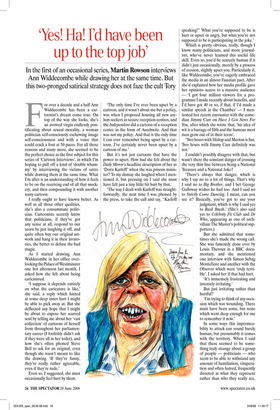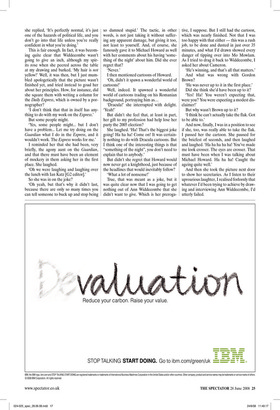‘Yes! Ha! I’d have been up to the top job’
In the first of an occasional series, Martin Rowson interviews Ann Widdecombe while drawing her at the same time. But this two-pronged satirical strategy does not faze the cult Tory For over a decade and a half Ann Widdecombe has been a cartoonist’s dream come true. On top of the way she looks, she’s an avowed virgin endlessly pontificating about sexual morality, a woman politician self-consciously eschewing image self-consciousness and with a voice that could crack a font at 50 paces. For all those reasons and many more, she seemed to be the perfect choice as the first subject for this series of ‘Cartoon Interviews’, in which I’m hoping to pull off a kind of ‘double whammy’ by interviewing the victims of satire while drawing them at the same time. What I’m after is an understanding of how it feels to be on the receiving end of all that mockery, and then compounding it with another nasty cartoon.
I really ought to have known better. As well as all those other qualities, she’s also a consummate politician. Cartoonists secretly know that politicians, if they’ve got any sense at all, respond to our scorn by just laughing it off, and quite often buy our original artwork and hang it in their lavatories, the better to defuse the bad magic.
As I started drawing Ann Widdecombe in her office overlooking the Palace of Westminster one hot afternoon last month, I asked how she felt about being caricatured.
‘I suppose it depends entirely on what the caricature is like,’ she said, a reply which hinted at some deep inner hurt I might be able to pick away at. But she deflected any hope that I might be about to expose her scarred soul by telling me about her ‘vast collection’ of cartoons of herself from throughout her parliamentary career (I foolishly didn’t ask if they were all in her toilet), and how she’s often phoned Steve Bell to ask for an original, even though she wasn’t meant to like the drawing. ‘If they’re funny, they’re really rather agreeable, even if they’re rude.’ Even so, I suggested, she must occasionally feel hurt by them. ‘The only time I’ve ever been upset by a cartoon, and it wasn’t about me but a policy, was when I proposed housing all new asylum seekers in secure reception centres, and the Independent did a cartoon of a reception centre in the form of Auschwitz. And that was not my policy. And that is the only time I can ever remember being upset by a cartoon. I’ve certainly never been upset by a cartoon of me.’ But it’s not just cartoons that have the power to upset. How had she felt about the Daily Mirror’s headline description of her as ‘Doris Karloff’ when she was prisons minister? To my dismay she laughed when I mentioned it, but pressing on I said she must have felt just a tiny little bit hurt by that.
‘The way I dealt with Karloff was straightforwardly, the next time I was phoned by the press, to take the call and say, “Karloff speaking!” What you’re supposed to be is hurt or upset or angry, but what you’re not supposed to be is participating in the joke.’ Which is pretty obvious, really, though I know many politicians, and more journalists, who’ve never learned this useful life skill. Even so, you’d be scarcely human if it didn’t just occasionally, merely by a process of erosion, slightly upset you. Particularly if, like Widdecombe, you’ve eagerly embraced the media in an almost Faustian pact. After she’d explained how her media profile gave her opinions access to a massive audience — ‘I got four million viewers for a programme I made recently about benefits, and I’d have got 40 or so, if that, if I’d made a similar speech in the Chamber’ — I mentioned her recent encounter with the comedian Jimmy Carr on Have I Got News For You, after which she wrote that, ‘his idea of wit is a barrage of filth and the humour most men grow out of in their teens’.
‘Two hours with Hislop and Merton is fun. Two hours with Jimmy Carr definitely was not.’ I couldn’t possibly disagree with that, but wasn’t there the constant danger of crossing the very thin line between being a National Treasure and a National Joke?
‘There’s always that danger, which is why I say no to a lot of things. That’s why I said no to Big Brother, and I bet George Galloway wishes he had too. And I said no to Strictly Come Dancing. I mean, can you see it? Basically, you’ve got to use your judgment, which is why I said yes to Basil Brush.’ (She’s also said yes to Celebrity Fit Club and Dr Who, appearing as one of archvillain The Master’s political supporters.) But she admitted that sometimes she’s made the wrong call. She was famously done over by Louis Theroux in a BBC documentary, and she mentioned one interview with Simon Sebag Montefiore and another with the Observer which were ‘truly terrible’. I asked her if that had hurt.
‘It’s immensely frustrating and intensely irritating.’ But just irritating rather than hurtful?
‘I’m trying to think of any occasion which was wounding. There must have been some, but none which went deep enough for me to remember it now.’ In some ways this impermeability to attack can sound barely human, but presumably it comes with the territory. When I said that there seemed to be something truly strange about a group of people — politicians — who seem to be able to withstand any amount of humiliation, vituperation and often hatred, frequently directed at what they represent rather than who they really are, she replied, ‘It’s perfectly normal, it’s just one of the hazards of political life, and you don’t go into that life unless you’re really confident in what you’re doing.’ This is fair enough. In fact, it was becoming quite clear that Widdecombe wasn’t going to give an inch, although my spirits rose when she peered across the table at my drawing and barked, ‘My hair is not yellow!’ Well, it was then, but I just mumbled apologetically that the picture wasn’t finished yet, and tried instead to goad her about her principles. How, for instance, did she square them with writing a column for the Daily Express, which is owned by a pornographer?
‘I don’t think that that in itself has anything to do with my work on the Express.’ But some people might.
‘Yes, some people might... but I don’t have a problem... Let me try doing on the Guardian what I do in the Express, and it wouldn’t work. The Express works for me.’ I reminded her that she had been, very briefly, the agony aunt on the Guardian, and that there must have been an element of mockery in them asking her in the first place. She laughed.
‘Oh we were laughing and laughing over the lunch with Ian Katz [G2 editor].’ So she was in on the joke?
‘Oh yeah, but that’s why it didn’t last, because there are only so many times you can tell someone to buck up and stop being so damned stupid.’ The tactic, in other words, is not just taking it without suffering any apparent damage, but giving it too, not least to yourself. And, of course, she famously gave it to Michael Howard as well with her comments about his having ‘something of the night’ about him. Did she ever regret that?
‘Never.’ I then mentioned cartoons of Howard. ‘Oh, didn’t it spawn a wonderful world of cartoons!’ Well, indeed. It spawned a wonderful world of cartoons trading on his Romanian background, portraying him as...
‘Dracula!’ she interrupted with delight. ‘Yeah!’ But didn’t she feel that, at least in part, her gift to my profession had help lose her party the 2005 election?
She laughed. ‘Ha! That’s the biggest joke going! Ha ha ha! Come on! It was certainly nothing to do with Dracula cartoons. But I think one of the interesting things is that “something of the night”, you don’t need to explain that to anybody.’ But didn’t she regret that Howard would now never get a knighthood, just because of the headlines that would inevitably follow?
‘What a lot of nonsense!’ True, that was meant as a joke, but it was quite clear now that I was going to get nothing out of Ann Widdecombe that she didn’t want to give. Which is her preroga tive, I suppose. But I still had the cartoon, which was nearly finished. Not that I was too happy with that either — this was a rush job, to be done and dusted in just over 35 minutes, and what I’d drawn showed every danger of tipping over into Mo Mowlam. As I tried to drag it back to Widdecombe, I asked her about Cameron.
‘He’s winning, and that’s all that matters.’ And what was wrong with Gordon Brown?
‘He was never up to it in the first place.’ Did she think she’d have been up to it? ‘Yes! Ha! You weren’t expecting that, were you? You were expecting a modest dis claimer!’ But why wasn’t Brown up to it?
‘I think he can’t actually take the flak. Got to be able to.’ And now, finally, I was in a position to see if she, too, was really able to take the flak. I passed her the cartoon. She paused for the briefest of seconds, and then laughed and laughed. ‘Ha ha ha ha ha! You’ve made me look crosser. The eyes are crosser. That must have been when I was talking about Michael Howard. Ha ha ha! Caught the ageing quite well.’ And then she took the picture next door to show her secretaries. As I listen to their uproarious laughter, I realised forlornly that whatever I’d been trying to achieve by drawing and interviewing Ann Widdecombe, I’d utterly failed.



















































































 Previous page
Previous page